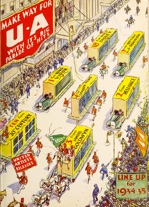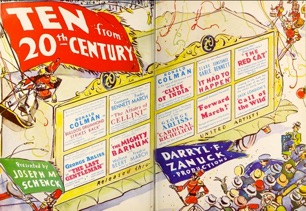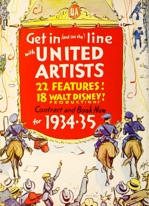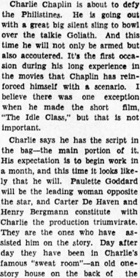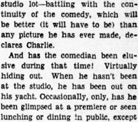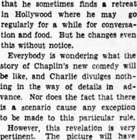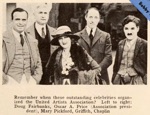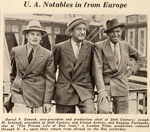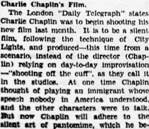Modern Times 1935 1936 1937 next previous
Modern Times Clippings 92/382
Edwin Schallert, Los Angeles Times, L. A., Cal., July 1, 1934.
MAKE WAY FOR U. A.
WITH ITS BIG PARADE OF HITS
LINE UP for 1934-35 (...)
Get in (and on the) line
with UNITED ARTISTS
22 FEATURES!
18 WALT DISNEY! PRODUCTIONS
Contact and Book Now
for 1934-35
TEN from 20th CENTURY (...)
Presented by JOSEPH M. SCHENCK (...)
DARRYL F. ZANUCK PRODUCTIONS
(...) Cartoon Ad, Motion Picture Daily, July 26, 1934
& Remember when these outstanding celebrities
organized the United Artists? Left to right: Doug Fairbanks,
Oscar A. Price (Association president), Mary Pickford,
Griffith, Chaplin
(...) The Star-Maker Whose Dreams Turned to Dust. What
price has Griffith got for so much glory? He denies
he is „broke“. By Mildred Mastin, Photo, Photoplay, May 1934
& U. A. Notables in from Europe
Photo. Darryl F. Zanuck, vice-president and production
chief of 20th Century; Joseph M. Schenck,
president of 20th Century and United Artists, and Douglas
Fairbanks, star of The Private Life of Don Juan,
a London Films production released through U. A., upon
their return from abroad on the Rex yesterday.
(...) Motion Picture Daily, Aug. 16, 1934
& Charlie Chaplin‘s Film.
The London „Daily Telegraph“ states Charlie Chaplin was
to begin shooting his new film last month. It is to be
a silent film, following the technique of City Lights, and
produced – this time from a scenario, instead
of the director (Chaplin) relying on day-to-day improvisation
– „shooting off the cuff“, as they call it in the studios.
At one time Chaplin thought of playing an immigrant whose
speech nobody in America understood, and the other
characters were to talk. But now Chaplin will adhere to the
silent art of pantomime, which he believes to be his
strength. „I shall be pretty much the same character I‘ve been
in other films,“ Mr. Chaplin explained. „Pauline
Goddard, my leading lady, will be a sort of gamine type,
and Henry Bergman will be in the cast.“
(...) THEATRE and SCREEN, Age, Melbourne,
Australia, Aug. 8, 1934
„We ran into a stone wall at the end of the fourth reel“
Editorial content. „New Chaplin Comedy
Finally Ready to Film
For First Time in Life Charlie Using Scenario and Working
Right on Schedule on ,Best Silent of Them All‘
By EDWIN SCHALLERT
Charlie Chaplin is about to defy the Philistines. He is going
out with a great big silent sling to bowl over the talkie
Goliath. And this time he will not only be armed but also
accoutered. It‘s the first occasion during his long
experience in the movies that Chaplin has reinforced himself
with a scenario. I believe there was one exception
when he made the short film, The Idle Class, but that is not
important.
Charlie says he has the script in the bag – the main portion
of it. His expectation is to begin work in a month, and
this time it looks likely that he will. Paulette Goddard will be
the leading woman opposite the star, and Carter
De Haven and Henry Bergman constitute with Charlie the
production triumvirate. They are the ones who have
assisted him on the story. Day after day they have been
in Charlie‘s famous ,sweat room‘ – an old one-story
house on the back of the studio lot – battling with the continuity
of the comedy, which will be better (it will have to
be) than any picture he has ever made, declares Charlie.
And has the comedian been elusive during
that time! Virtually hiding out. When he hasn‘t been at the
studio, he has been out on his yacht. Occasionally,
only, has he been glimpsed at a premiere or seen lunching
or dining in public, except that he sometimes finds
a retreat in Hollywood where he my go regularly for a while
for conversation and food. But he changes even
this without notice.
Everybody is wondering what the story of Chaplin‘s new
comedy will be like, and Charlie divulges nothing
in the way of details in advance. Nor does the fact that there
is a scenario cause any exception to be made to this
particular rule.
However, this revelation is very pertinent. The picture
will have much to do with machinery, and will have
very large sets, and big crowds will be used – much bigger
than in any previous Chaplin picture. Modern industry
will be the background, and there will probably be a pathetic
close. The film will not be a sequel to City Lights,
made three years ago, as rumored, but something quite
independent. The machinery and industrial phases
of the plot will be treated very lightly.
The reason for the unusually extensive advance
preparations is that the picture is to be done on
a bigger scale than any which Chaplin has previously made.
He declares that on this occasion if inspiration bursts
forth on the set it is not going to interfere with the steady progress
of the filming.
The inspiration is having its fling in advance. Huge mobs
of people can‘t be held up while it is developing, and
the cameras wait. Hence Chaplin expects also to finish the film
in record time.
A DEVOTEE OF ROUTINE
In the past he has often knocked off work for weeks and even
months while waiting for the right mood to continue.
But now he has become a devotee of routine. De Haven and
Bergman both swear to that. ,Charlie has been with
us each morning at 9; and we‘ve worked without ceasing all day,
and often late into the night,‘ Charlie himself avers that
he is all tired out at the present time, but exceedingly happy
over the outlook for the picture.
,We ran into a stone wall at the end of the fourth reel
in preparing the story,‘ he said. ,It seemed an insurmountable
wall for a time, and that was what baffled and delayed
us. But we have found the way out now. The last four reels
of the picture are now completed in scenario form.
There only remain some of the details to be worked out, and
that is not difficult. We are going to have a full shooting
script for the actors, and a full shooting script for the cameraman.
Everything is to be mapped out thoroughly. When we go
into the picture we will be prepared to carry it directly through
to completion.
,It is absolutely essential that in this case we have
everything ready and right in advance. I have
never made any previous important production in this manner.
But this film is going to have spectacular scenes
with large sets, and crowds of extras, and we cannot risk any
indefiniteness.
SOUND EFFECTS
,I recognize the difficulties of competing with talking
pictures, and this picture must therefore be finer
and more significant than any which I have made. There will
be no dialogue, but we expect to make excellent use
of sound effects. Much, indeed, can be added to the picture
through sound in the abstract. It can greatly accent
the entire meaning of a scene, and has splendid comedy
possibilities.‘
Until now nothing has been authentically told of the scope
and character of Chaplin‘s comedy, and this is the first
word of importance on the subject, coming from the star himself.
As Chaplin himself averred, it will be a picture that is a
human document rather than one dealing with a sociological
condition. The main issue that caused difficulty when
the end of the fourth reel was reached was owing to the danger
of entering too much into a sociological sphere, but
that was neatly avoided.
The picture will doubtless have great significance
in Charlie‘s own life, for it is pretty judiciously
surmised that when it is completed, the marriage of Charlie
and Miss Goddard will also take place. It is certainly
not going to eventuate before the film is completed, according
to the best beliefs, else how would the aura of romance
about the two characters in the film be preserved?“
Redaktioneller Inhalt
Modern Times 1935 1936 1937 next previous

